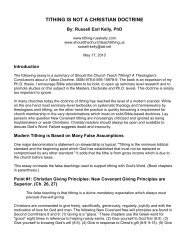âWill a Man Rob God?â (Malachi 3:8) - Biblical Foundations
âWill a Man Rob God?â (Malachi 3:8) - Biblical Foundations
âWill a Man Rob God?â (Malachi 3:8) - Biblical Foundations
You also want an ePaper? Increase the reach of your titles
YUMPU automatically turns print PDFs into web optimized ePapers that Google loves.
22<br />
provide five sets of description of Melchizedek: (1) king of Salem; (2) priest of <strong>God</strong>; (3) the one<br />
who met Abraham and to whom Abraham gave a tithe; (4) king of righteousness; and (5) king of<br />
Salem, that is, king of peace. This is followed by a reference to Melchizedek’s lack of genealogy,<br />
in which he resembles the Son of <strong>God</strong>. 134 In these first three verses, there is only one major<br />
theme: Melchizedek remains a priest forever. All other thoughts are secondary. The conjunction<br />
de, in verse 4 indicates the next phase of the argument, not a shift in time. 135 Verses 4–8<br />
constitute the significant theological section since it contains the “proofs” that will carry the<br />
author’s argument.<br />
While the main purpose of Heb 7:1–3 is to demonstrate the greatness of Melchizedek, 136<br />
verse four states that Melchizedek is great (phlivkos). Hebrews 7:4–10 provides three 137 specific<br />
reasons (or proofs) that Melchizedek’s priesthood was superior to the Levitical priesthood. First,<br />
Melchizedek is shown to be greater than Abraham on account of Abraham’s voluntary offering<br />
to him. 138 The fact that Melchizedek received a tithe 139 from Abraham is the central argument for<br />
Melchizedek’s superiority. 140 Levi and Aaron were both ancestors of Abraham. When the author<br />
of Hebrews says that “even Levi … paid tithes,” the superiority of Melchizedek’s priesthood is<br />
proved. Therefore Melchizedek’s priesthood is superior to the Levitical one.<br />
Second, Melchizedek is shown to be greater, because he was the one who blessed<br />
Abraham, not vice versa. The greater one was the one who blessed the lesser one, while the<br />
Joseph A. Fitzmeyer, “‘Now this Melchizedek …’ (Heb 7,1),” CBQ 25 (1963): 305, also provides a compelling<br />
rationale.<br />
134 See Deborah W. Rooke, “Jesus as Royal Priest,” Bib 81 (2000): 87, for a similar description of vv. 1–3.<br />
135 Paul Ellingworth and Eugene A. Nida, A Translator’s Handbook on the Letter to the Hebrews (Helps for<br />
Translators; New York: United Bible Societies, 1983), 138.<br />
136 See Koester, Hebrews, 347.<br />
137 See Leon Morris, “Hebrews,” in The Expositor’s Bible Commentary (vol. 12; ed. Frank E. Gaebelein; Grand<br />
Rapids: Zondervan, 1981), 62, who provides five reasons. The difference is simply a matter of categorization. James<br />
Moffatt, A Critical and Exegetical Commentary on the Epistle to the Hebrews (ICC; Edinburgh: T. & T. Clark,<br />
1924), 93, finds three reasons as well, but he combines our first two and adds that Levi gave tithes while in<br />
Abraham’s loins. Kurianal, Jesus Our High Priest, 99, detects two reasons. Finally, Fitzmeyer, “‘Now this<br />
Melchizedek …’ (Heb 7,1),” 314–16, sees three.<br />
138 It should be noted that the text of Gen 14 is unclear about who gave a tenth to whom. Walter Edward Brooks,<br />
“The Perpetuity of Christ’s Sacrifice in the Epistle to the Hebrews,” JBL 89 (1970): 206, says that the author of<br />
Hebrews simply adopted the current view.<br />
139 Note that Ellingworth, The Epistle to the Hebrews, 365, points out that the perfect of dekatovw refers to the tithe<br />
having “permanent validity and effect.” See also ibid., 369: “The permanent significance of the tithing of Abraham,<br />
and thus of Levi, is indicated by the present lambavnwn (v. 8) and the perfect dedekavtwtai.”<br />
140 See ibid., 360; Theodore H. <strong>Rob</strong>inson, The Epistle to the Hebrews (MNTC 13; New York: Harper, 1933), 95.








